
Basque is the last surviving Paleo-European language spoken indigenously in Europe, predating the Indo-European languages of the Bronze Age invasion of Europe from the Black Sea by pastoralists whose descendant languages dominate the continent today. Basque is spoken by the Basques and other residents of the Basque Country, a region that straddles the westernmost Pyrenees in adjacent parts of northern Spain and southwestern France. Linguistically, Basque is classified as a language isolate, as a relationship to any of the other known extinct pre-Indo-European languages of Europe has not been established, nor is it related to the later arriving Indo-European languages. The Basques are indigenous to, and primarily inhabit, the Basque Country. The Basque language is spoken by 28.4% (751,500) of Basques in all territories. Of these, 93.2% (700,300) are in the Spanish area of the Basque Country and the remaining 6.8% (51,200) are in the French portion.
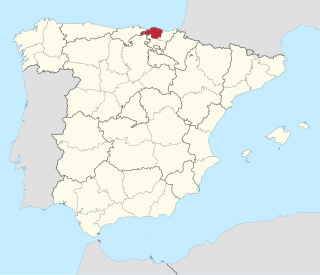
Biscay is a province of Spain and a historical territory of the Basque Country, heir of the ancient Lordship of Biscay, lying on the south shore of the eponymous bay. The capital and largest city is Bilbao.
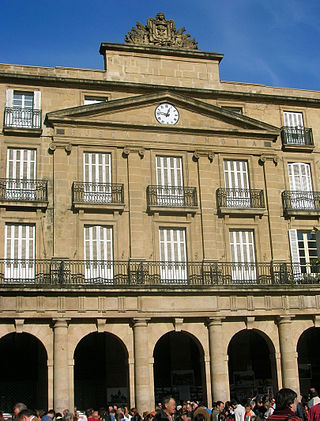
Euskaltzaindia is the official academic language regulatory institution which watches over the Basque language. It conducts research, seeks to protect the language, and establishes standards of use. It is known in Spanish as La Real Academia de la Lengua Vasca and in French as Académie de la Langue Basque.
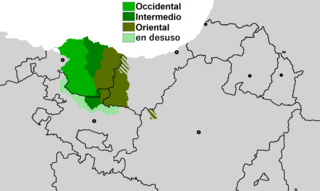
Biscayan, sometimes Bizkaian, is a dialect of the Basque language spoken mainly in Biscay, one of the provinces of the Basque Country of Spain.
Gipuzkoan is a dialect of the Basque language spoken mainly in the central and eastern parts of the province of Gipuzkoa in Basque Country and also in the northernmost part of Navarre. It is a central dialect of Basque according to the traditional dialectal classification of the language based on research carried out by Lucien Bonaparte in the 19th century. He included varieties spoken in the Sakana and Burunda valleys also in the Gipuzkoan dialect, however this approach has been disputed by modern Basque linguists.

Standard Basque is a standardised version of the Basque language, developed by the Basque Language Academy in the late 1960s, which nowadays is the most widely and commonly spoken Basque-language version throughout the Basque Country. Heavily based on the literary tradition of the central areas, it is the version of the language that is commonly used in education at all levels, from elementary school to university, on television and radio, and in the vast majority of all written production in Basque.

The Merindad de Uribe or Uribealdea is a historical subdivision of Biscay, Basque Country, Spain. It contained most of the municipalities now within the comarca of Greater Bilbao in the Bilbao metropolitan area. The parts of Uribe which now fall under Greater Bilbao are:

Kirmen Uribe is a Basque language writer. He won the National Prize for Literature in Spain in 2009 for his first novel Bilbao-New York-Bilbao, which has been translated into over 15 languages. His poetry collection Meanwhile Take My Hand, translated into English by Elizabeth Macklin, was a finalist for the 2008 PEN Award for Poetry in Translation. His works have been published in The New Yorker, Open City and Little Star.

Koldo Mitxelena Elissalt was an eminent Basque linguist. He taught in the Department of Philology at the University of the Basque Country, and was a member of the Royal Academy of the Basque Language.

Basque dialects are linguistic varieties of the Basque language which differ in pronunciation, vocabulary and grammar from each other and from Standard Basque. Between six and nine Basque dialects have been historically distinguished:

Salazarese is the Basque dialect of the Salazar Valley of Navarre, Spain.

José María Sánchez Carrión is a Spanish linguist, specialised in Basque language, sociolinguistics and historical linguistics. He is an associate member of Euskaltzaindia since 1983. Despite being arguably the best known local academic proponent of reversing language shift measures, he has never held a stable university post in the Basque Country.
José Ignacio Hualde is a Spanish linguist specialised in Basque linguistics and in Spanish synchronic and diachronic phonology, professor of linguistics in the Department of Spanish and Portuguese, and in the Department of Linguistics, at the University of Illinois at Urbana–Champaign. He is also the current vice president of the Association for Laboratory Phonology.
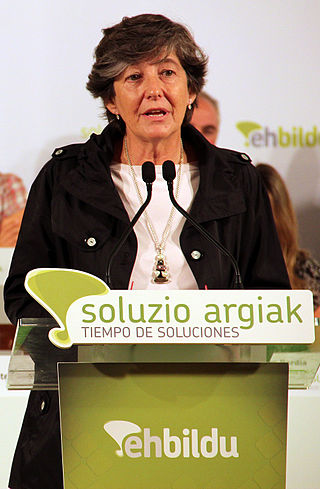
Laura Mintegi Lakarra is a Basque author, politician and a professor at the University of the Basque Country. Although she was born in Navarre, she moved to Biscay at an early age and has lived there ever since; first in Bilbao and later in Algorta.
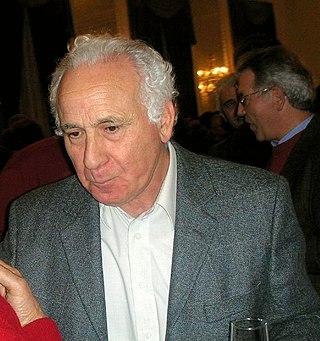
Joxe Azurmendi Otaegi is a Basque writer, philosopher, essayist and poet. He has published numerous articles and books on ethics, politics, the philosophy of language, technique, Basque literature and philosophy in general.

Alavese is an extinct dialect of the Basque language spoken formerly in Álava, one of the provinces of the Basque Country of Spain. The modern-day communities of Aramaio and Legutio along the northern border with Biscay do not speak the Alavese dialect but a variant of the Biscayan dialect instead and while overall some 25% of people in Álava today are Basque speakers, the majority of these are speakers of Standard Basque who acquired Basque via the education system or moved there from other parts of the Basque Country.

Arantxa Iturbe Maiz, is a Basque journalist, announcer, and writer in the Basque language.

Mikel Zalbide Elustondo is a Basque linguist and sociolinguist.

Katixa Agirre Miguelez is a Spanish writer of Basque origin.
Francisco Juaristi Larrinaga, known as Patxi Juaristi, is a Basque sociologist, linguist, writer and university professor, current vice-rector of the University of the Basque Country.

















